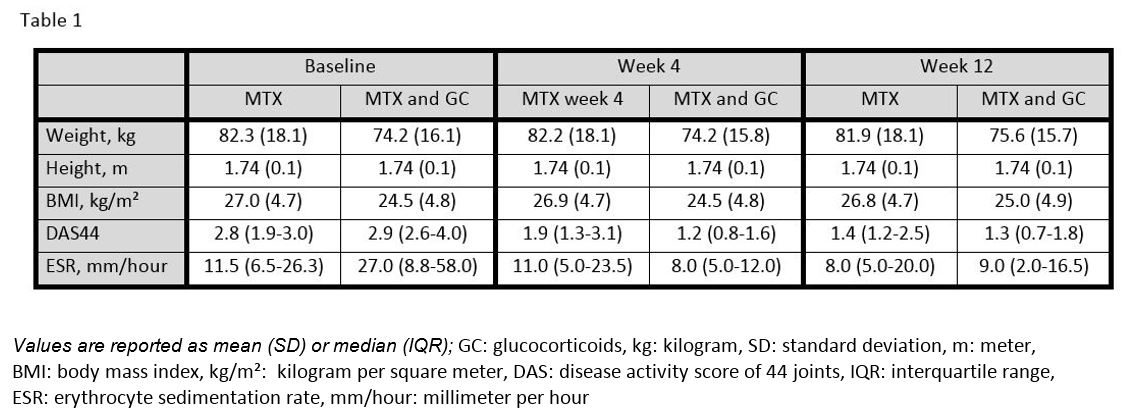Session Information
Session Type: ACR Poster Session C
Session Time: 9:00AM-11:00AM
Background/Purpose: After the diagnosis of rheumatoid arthritis (RA), glucocorticoids (GCs) are a common initial treatment in addition to methotrexate (MTX)(1). However, many patients are afraid to gain weight as side effect of the GCs. Therefore, we studied the effect of GCs on body mass index (BMI) after 4 and 12 weeks of treatment.
Methods: Consecutive patients from our early arthritis cohort, with a disease duration of <2 years, at least 2 swollen joints and no prior DMARD treatment were investigated. Patients were divided in two groups: GC-users were treated with MTX and GC (week 1: 30 mg, week 2: 20 mg, week 3: 15 mg, week 4-8: 10 mg, week 9-12: 7,5 mg), and non GC-users were treated with monotherapy MTX. Patients were placed in the GC-users group when they had a high disease activity and/or unfavourable prognostic factors. For this study the 22 non GC-users were matched on age to 22 GC-users. At baseline, week 4 and week 12, weight, height, BMI and a DAS44 were assessed. For statistical analyses, patients with an increase in BMI were compared with patients with a stable or decreased BMI.
Results: Of the 44 early RA patients, 24 were male; mean age was 54 years. Patients with versus without GCs had a mean weight at baseline of 74.2 and 82.3 kg, respectively (table 1). Both groups had a similar, large mean improvement in DAS. After 4 weeks of treatment, BMI increased in 41% of the GC-users versus 32% in de non GC-users, (p= 0.532). After 12 weeks, 55% of the GC-users had an increase in BMI versus 23% in the non GC-users, (p= 0.025, table 2). There is no statistically significant difference in DAS44 between the high and low risk group at baseline or after 12 weeks of treatment.
Conclusion: Early RA patients treated with MTX and GCs more often have an increase in BMI compared to patients treated with MTX monotherapy after 12 weeks of treatment. This difference is not caused by a difference in disease activity. These substantial differences appear to be caused by GC-induced changes in body composition and need to be further investigated during a longer follow-up period. Literature: 1) Boers M et al. Lancet 1997 Aug 2;350(9074):309-18.
To cite this abstract in AMA style:
Turk SA, Rasch LA, de Boer S, Nurmohamed MT, Lems WF, van Schaardenburg D. Glucocorticoid Treatment for 12 Weeks in Early Rheumatoid Arthritis Is Related to an Increase in BMI [abstract]. Arthritis Rheumatol. 2016; 68 (suppl 10). https://acrabstracts.org/abstract/glucocorticoid-treatment-for-12-weeks-in-early-rheumatoid-arthritis-is-related-to-an-increase-in-bmi/. Accessed .« Back to 2016 ACR/ARHP Annual Meeting
ACR Meeting Abstracts - https://acrabstracts.org/abstract/glucocorticoid-treatment-for-12-weeks-in-early-rheumatoid-arthritis-is-related-to-an-increase-in-bmi/


